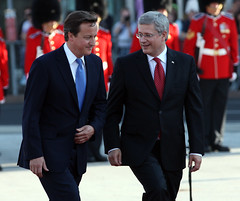We were lucky last week to have David Cameron in Ottawa. He flew in from New York, where he was speaking to the General Assembly, to a whirlwind programme here.
First, he laid a wreath at the War Memorial, in a solemn ceremony of remembrance, to mark British appreciation for Canadian service and sacrifice in two World Wars and many other conflicts, up to and including Afghanistan and Libya. Red tunics on parade, a 19 gun salute and the sobering notes of the Last Post and the Piper’s Lament added to the force of the occasion.
Then the PM was off to Parliament, where Stephen Harper introduced him to a joint session of House and Senate. David Cameron was fully aware that other recipients of the honour of addressing a sister Parliament included Winston Churchill and Margaret Thatcher. He spoke about the strength and breadth of the Canada-Britain relationship, from its historical foundations, military bonds and shared values, to the present and future, based on mutually profitable trade and investment, science and technology and a lively exchange between people and institutions across the Atlantic.
He also spoke about the global economic crisis. He saw it as a debt crisis, where the usual levers of interest rates and government spending, based on more government borrowing, were not effective. He thought governments – while responding to individual national economic and political circumstances – should look seriously at deficit reduction, the re-structuring of their economies, and at ways to stimulate trade, internationally and bilaterally, as an engine for global growth.
The two Prime Ministers then had a bilateral meeting, followed by a press conference; and endorsed a Joint Declaration between our two countries, which focussed on building economic, commercial and scientific cooperation, innovation and entrepreneurship, securing our societies, and finding ways to promote our shared values internationally.
Perhaps above all, the visit itself was an index to the close and strengthening links between governments and countries. Another is agreement by the British Government to upgrade our trade and investment office in Calgary to a full Consulate-General. This should happen next year, and is a sign of confidence in Alberta’s current and projected economic growth.

